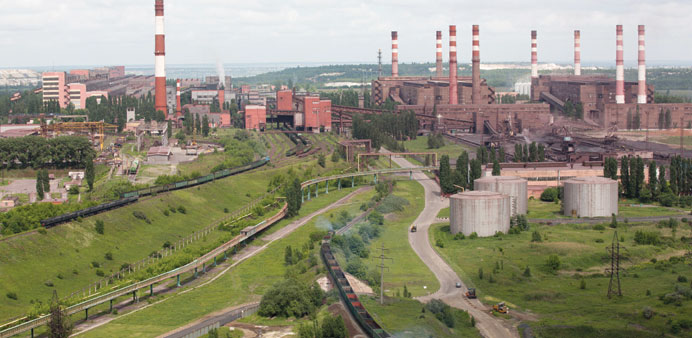The iron ore mining and processing plant operated by Metalloinvest Holding Co is seen in Gubkin, Russia. The iron-ore miner opted to borrow $750mn from international lenders including Chinese banks last week, after saying in June that the Eurobond market is showing signs of opening.
Bloomberg/Moscow
For Russian companies, the cheapest bond- market cash since the Crimea incursion isn’t enough to tempt them away from loans.
Even after plunging 327 basis points this year, yields on Russian company bonds are about triple the average rate on bank facilities extended since the start of 2014, according to data compiled by Bloomberg. As loans climbed 61% quarter-on- quarter to $1.3bn through June 30, corporate borrowers haven’t sold a single new Eurobond, the data show.
The relative affordability of bank credit is posing another hurdle to restarting Russia’s Eurobond pipeline after sanctions over the conflict in Ukraine practically closed that avenue for financing. Iron-ore miner Metalloinvest Holding Company opted to borrow $750mn from international lenders including Chinese banks this week, after saying in June that the Eurobond market is showing signs of opening.
“Bilateral long-term credit lines from international and Russian banks look more attractive now in terms of debt maturity and rates,” Sergey Malyshev, the chief financial officer of PAO GMK Norilsk Nickel, Russia’s biggest miner, said in an interview. Malyshev said he’s “monitoring” the situation on the Eurobond market although the company doesn’t have an urgent need to refinance.
Metalloinvest secured five- and seven-year financing from its lenders, according to a July 15 regulatory filing. It said it would use part of the cash toward redeeming the $750mn of Eurobonds due in July 2016, which yielded 4.43% last week, compared with 10.32% at the end of 2014.
While the miner of iron ore didn’t say how much it was paying for its loan, dollar-denominated facilities from Russian companies have cost an average of 2.55 percentage points above the London Interbank Offered Rate since the end of 2013, according to data compiled by Bloomberg.
Over the same period, the yield on a Russian corporate dollar bond index tracked by JPMorgan Chase & Co averaged 8.48%.
Eurobond sales have stalled since Alfa-Bank offered $250mn in November. The first borrowers to try to break this freeze will need to offer premiums of as much as 250 basis points above their current yields, Egor Fedorov, an analyst at ING Groep in Moscow, said by e-mail.
Fedorov anticipates companies won’t be able to avoid the bond market for long as international banks have restrictions on how much they can lend to Russian issuers. Norilsk, Metalloinvest, Gazprom, Lukoil, EuroChem Group and Bank Otkritie Financial Co are potential candidates to tap bond markets, ING and Sberbank CIB said.
“My guess is that most companies that decide to issue new paper will come to the market after the summer holidays,” Alexey Bulgakov, an analyst at Sberbank CIB in Moscow, said by e-mail.
Pig-iron maker Koks this month raised $137mn in a bond sale, while Lukoil may consider bonds next year, CEO Vagit Alekperov said in June. Its press service offered no follow up comment. Otkritie doesn’t have immediate plans for a bond sale, its media office said the same day, while Gazprom’s didn’t comment when contacted by Bloomberg.
Selling rouble bonds and swapping the proceeds into dollars may be a cheaper way to secure cash that by selling Eurobonds, Andrey Guryev, the chief executive officer at fertilizer maker Phosagro, said by e-mail.
Until the drought ends, companies may continue to choose bank loans for funding. Uralkali, the world’s largest potash producer, got a four-year syndicated loan in April at 3.3 percentage points above Libor. That compares with a yield of 6.68% on the company’s April 2018 bonds today, a drop of almost half since a 2015 high in January. “There are cheaper sources of funding available out there” than bonds, EuroChem said in response to e-mailed questions.

